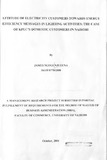| dc.description.abstract | Electricity is a versatile, clean and environment friendly source of energy. Its availability, pricing
and use will continue to be important factors as more customers get connected to the national grid
in Kenya. However major challenges are expected to continue presenting themselves in the areas
of affordability and use. There is emphasis worldwide for promotion of efficient use of electricity
in order to benefit various stakeholders such as customers, electricity companies and
governments. This is because sources of energy are limited; energy is a major portion of
operating costs; there is need to reduce bills; short lead time for energy conservation is
advantageous compared to long lead time for new power generation; energy conservation costs
are only a fraction compared to new power plants; and it ensures favorable environmental impact.
Hence, efficient use of electric energy would playa crucial role in this regard. It is therefore
critical to understand the attitude ofKPLC's domestic customers towards electric energy
efficiency promotional messages in lighting among other areas, given that this constitutes about
90% of all electric energy usage activities in Kenyan homes. This will help to gauge the
effectiveness of such messages disseminated by KPLC and a few NGOs, with a view to
developing measures that may facilitate effective use of electricity in lighting activities. This
study sought to establish this among domestic customers who form 80% ofKPLC customers
countrywide, with the focus being in Nairobi.
Using a descriptive research design, it has produced data regarding the key features of customers'
attitudes towards electric energy efficiency in lighting and developed profiles of the same. Key
among the findings, is that on overall attitude, customers rate as positive and significantly high
the attitude variable on believability/credibility of past/current energy efficiency messages as
indicated by the calculated standard deviation of 1.03, grand mean of3.9 and coefficient of
variation of 26.4 %. Significant also is that 92% of customers in Nairobi have heard about energy
saving bulbs and 97% of them are willing to learn more about the bulbs.
It was established that the leading attributes contributing to positive attitudes towards energy
efficiency messages as well as subsequent positive behaviour, are Savings on electricity bills
followed by Long Life and Brightness of energy efficient bulbs. Conversely, the leading
attributes associated with negative attitudes on the same are that the bulbs are Too expensive
followed by Lack of understanding about their benefits and Lack of believability in their benefits.
To be effective, future marketing strategies in energy efficient bulbs should therefore take into
account these negative and positive attributes. --
x | en |

